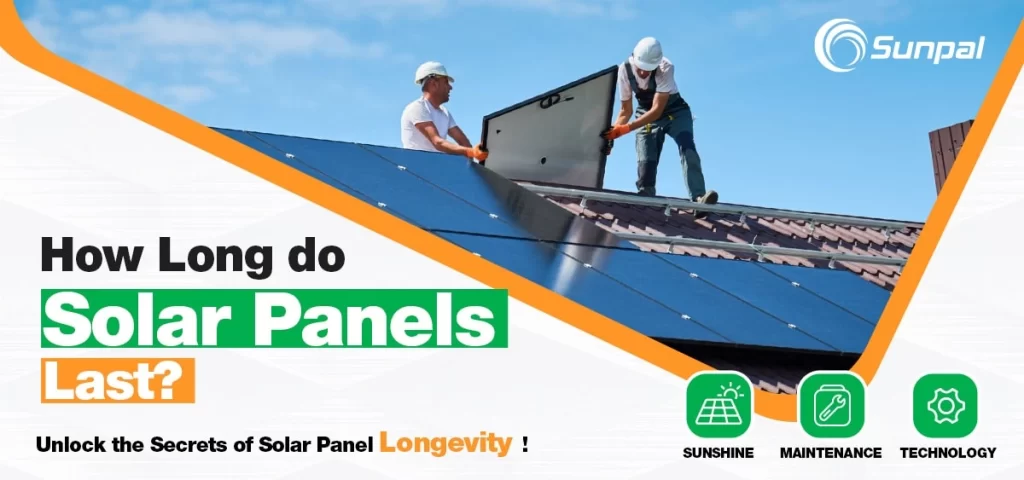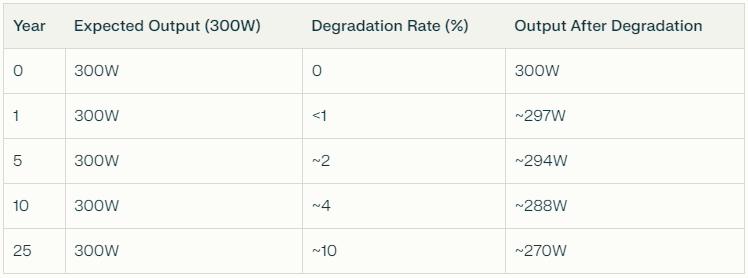
Introdução ao tempo de vida útil dos painéis solares
Se está a pensar investir em painéis solares, pode perguntar-se: "Qual é o tempo de vida útil dos painéis solares?"
Esta pergunta é crucial porque saber quanto tempo durarão os seus painéis solares pode influenciar significativamente as suas decisões de investimento.
Os painéis solares são um compromisso a longo prazo e o conhecimento do seu tempo de vida útil ajudá-lo-á a planear as suas futuras necessidades energéticas e poupanças financeiras.
Neste guia completo, vamos explorar os factores que influenciam a vida útil dos painéis solares, como maximizá-la e porque é tão importante escolher painéis de alta qualidade.
Na Sunpal Solar, orgulhamo-nos de fornecer soluções solares de qualidade superior que resistem ao teste do tempo.
Vamos aos pormenores!
Qual é o tempo médio de vida de Painel solars?
A vida útil média dos painéis solares é de 25 a 30 anos.
No entanto, isto não significa que os seus módulos deixarão de funcionar após este período.
Muitos painéis solares continuarão a produzir eletricidade mesmo depois de expirado o período de garantia, embora com uma eficiência inferior.
Pontos-chave sobre a vida útil dos painéis solares
- Garantias: A maioria dos painéis solares tem garantias de 20 a 25 anos.
- Taxa de degradação: Em média, muitos painéis solares degradam-se entre 0,5% e 1% por ano.
- Desempenho: Após 25 anos, muitos painéis podem ainda fornecer cerca de 80% da sua potência original.
Factores Isso Afetar a vida útil de Painel solars
Compreender os factores que afectam o tempo de vida dos painéis solares pode ajudá-lo a tomar decisões informadas sobre o seu investimento.
Eis alguns factores importantes que deve ter em conta:
1. Qualidade dos materiais
Os materiais utilizados no fabrico dos painéis solares desempenham um papel significativo na sua longevidade.
Materiais de qualidade superior conduzem frequentemente a uma vida útil mais longa do módulo.
- O painel solar bifacial ultra-preto TOPCon 580W da Sunpal Solar é um exemplo de qualidade.
- Possui monocélulas avançadas do tipo N e tem uma elevada eficiência de módulo de até 22,44%.
- A utilização de materiais duradouros assegura a longevidade e o desempenho.
2. Condições ambientais
Os painéis solares estão expostos a várias condições ambientais que podem afetar o seu tempo de vida:
- Radiação UV: A exposição prolongada pode degradar as células fotovoltaicas.
- Flutuações de temperatura: O calor ou o frio extremos podem causar ciclos térmicos, conduzindo a microfissuras.
- Eventos meteorológicos: O granizo, a neve intensa e os ventos fortes podem danificar fisicamente os painéis.
3. Práticas de manutenção
A manutenção regular pode prolongar significativamente a vida útil dos seus painéis solares:
- Limpeza: Manter os painéis limpos ajuda a manter a eficiência.
- Inspecções: As inspecções profissionais periódicas podem detetar problemas precocemente.
Taxas de degradação dos painéis solares ao longo do tempo
Como já foi referido, os painéis solares degradam-se com o tempo.
Mas o que é que isto significa em termos práticos?
Compreender as taxas de degradação
A maioria dos painéis solares apresenta uma taxa de degradação inicial de cerca de 1% no primeiro ano, seguido de aproximadamente 0.4% por ano depois.
Por exemplo, após 25 anos, um painel que começou com 300W pode produzir cerca de 240W.
Vantagem da Sunpal Solar
Com a tecnologia TOPCon utilizada nos produtos da Sunpal Solar, pode esperar taxas de degradação mais baixas:
- O Painel solar bifacial ultra-preto TOPCon 580W tem uma taxa de degradação anual de energia inferior a 0,40% por ano, garantindo uma maior produção de energia ao longo da sua vida útil.

O que acontece quando os painéis solares atingem o fim da sua vida útil?
Quando os seus painéis solares atingem o fim do seu tempo de vida útil, o que deve fazer?
Eis as suas opções:
Opções para painéis solares antigos
1. Reaproveitamento de energia: Substituir os painéis antigos por novos, mantendo a infraestrutura existente.
2. Desmantelamento: Remover e reciclar com segurança os painéis antigos.
Reciclagem e sustentabilidade no tempo de vida dos painéis solares
A reciclagem de painéis solares antigos é crucial para a sustentabilidade:
- Muitos componentes podem ser reutilizados ou reciclados, reduzindo os resíduos.
- A Sunpal Solar está empenhada na sustentabilidade e oferece soluções para a reciclagem de painéis antigos.
Inovações e o futuro do tempo de vida dos painéis solares
O futuro parece promissor para a tecnologia solar!
As inovações estão continuamente a melhorar a longevidade e a eficiência dos painéis solares:
Avanços na tecnologia
- Materiais duradouros: Estão a ser desenvolvidos novos materiais que resistem melhor aos factores de stress ambiental do que as opções tradicionais.
- Revestimentos repelentes de água e sujidade: Estes revestimentos minimizam as necessidades de manutenção, evitando a acumulação de sujidade nas superfícies dos painéis.
- Melhoria das concepções para reciclagem: Os novos designs facilitam os processos de reciclagem, garantindo a sustentabilidade.
Estudos de caso: Exemplos reais do tempo de vida útil dos painéis solares
Vejamos alguns exemplos do mundo real:
Exemplo 1: Instalação residencial
Um proprietário instalou o sistema de painéis solares ultra-negros bifaciais TOPCon da Sunpal Solar há cinco anos.
Após manutenção e limpeza regulares, registam um rendimento impressionante para os níveis de desempenho originais.
Exemplo 2: Aplicação comercial
Uma instalação comercial que utilizava painéis policristalinos mais antigos registou uma queda significativa na eficiência ao fim de 20 anos.
Decidiram substituí-los por módulos de alta eficiência da Sunpal, o que levou a um aumento notável da produção de energia e a uma poupança de custos.
Perguntas frequentes sobre o tempo de vida dos painéis solares
1. Qual é o tempo de vida médio de um painel solar?
A vida útil média de um painel solar é de 25 a 30 anos, mas muitos podem continuar a produzir eletricidade para além desse período, com níveis de eficiência reduzidos.
2. Quanto é que os painéis solares se degradam por ano?
Em média, os painéis solares degradam-se a uma taxa de cerca de 0,5% a 1% por ano, sendo que os modelos mais recentes têm geralmente um melhor desempenho devido aos avanços tecnológicos.
3. Posso esperar que os meus painéis solares funcionem após o período de garantia?
Sim! Embora as garantias cubram normalmente o desempenho durante cerca de 20-25 anos, muitos painéis solares continuam a funcionar eficazmente para além deste período.
4. Que factores contribuem para uma degradação mais rápida?
Factores como temperaturas extremas, exposição aos raios UV, fenómenos meteorológicos (como granizo ou neve intensa) e más práticas de manutenção podem contribuir para taxas de degradação mais rápidas dos painéis solares.
5. Como posso prolongar a vida útil do meu painel solar?
Para prolongar a vida útil do seu painel solar:
- Mantenha-os limpos de sujidade e detritos.
- Marcar inspecções regulares com profissionais.
- Assegurar uma ventilação adequada à volta dos painéis para evitar o sobreaquecimento.
Conclusão: Maximizar o seu investimento em painéis solares
Compreender o tempo de vida dos painéis solares é essencial para quem está a pensar mudar para a energia solar.
Com produtos de qualidade como o painel solar bifacial ultra-preto TOPCon da Sunpal Solar, está a investir em durabilidade e desempenho que resistem ao tempo.
Se está pronto para assumir o controlo do seu futuro energético e, ao mesmo tempo, usufruir de poupanças significativas nas facturas de serviços públicos, chegou o momento de explorar as suas opções!
Pode facilmente comprar painéis solares de um fabricante fiável diretamente através do nosso sítio Web em sunpalsolar.com.
